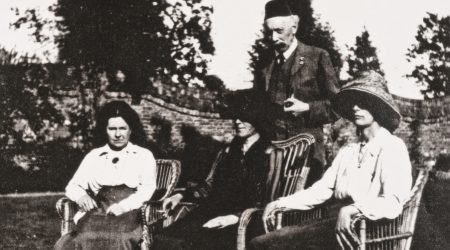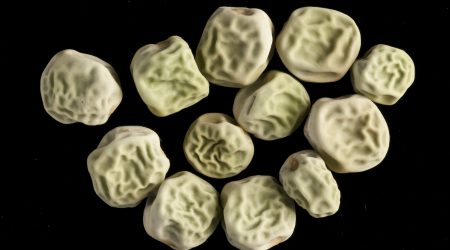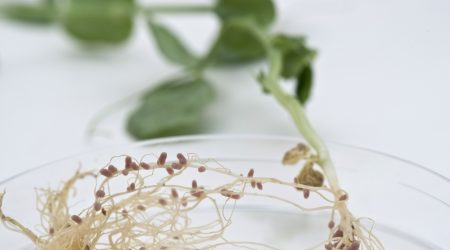We caught up with Rosanne Maguire, who joined the John Innes Centre as a MSc student working with Professor Claire Domoney on the genetic diversity of the ‘stay-green’ gene
Rosanne is now studying a PhD in the Warwick University molecular breeding programme under Professor Eric Holub.
What inspired you to get into science?
I knew I wanted to work with plants, but I didn’t realise it was science. I was working as a head gardener when curiosity led me back to education.
I spoke to Professor Domoney about her lab and research, and knew I wanted to do my MSc project in her group using the John Innes Centre pea collection.
I had heard of John Innes Centre, not just because of the compost, but being from Norfolk I knew about it inherently and that it would be the best place to learn more about plants. I was accepted on to the MSc course and transitioned from the garden into the lab.
What did you work on with Professor Domoney?
My project explored the genetic diversity of the ‘stay-green’ gene (SGR) in the pea collection.
The natural colour of seeds is considered a key factor in determining market values for pea crops. My project used a multiplex PCR assay designed to discriminate wild type pea SGR alleles from mutant alleles.
We were successful in detecting targeted mutant alleles, as well as identifying novel mutants, which could then be exploited in pea-breeding programmes aimed at improving seed colour quality.
It was also important for me personally as I learnt fundamental laboratory skills and it opened my eyes to research.
I was awarded the Colin Law prize for best MSc PGCI student of the year 2013-14 by the Board of Examiners, a reflection of the mentoring I received from Professor Domoney and her group.
How did you go from John Innes Centre to Warwick?
I went straight from handing in my MSc thesis to working in industry on an Innovate UK Knowledge Transfer Partnership (KTP) project at Elsoms Seeds Ltd, a UK plant-breeding company. I developed and embedded protocols at the company for maintaining and storing plant pathogens important to UK growers.
I spent a few months training at the Crop Centre before being based at the company for a year-and-a-half. I was impressed with the translational research, so towards the end of the project I applied for a BBSRC-funded ‘Midlands Integrative Biosciences Training Partnership’ food-security themed PhD.
I wanted to return to working with a legume crop and to develop specific plant-breeding skills. I knew the Warwick Crop Centre would help me do both.
You’re now doing a PhD – what question are you hoping to answer and why?
My PhD is part of the molecular breeding programme led by Professor Eric Holub to adapt common dry bean (Phaseolus vulgaris L.) for UK food production. Common dry beans are the main ingredient in British-style baked beans and other popular types including kidney, borlotti, cannellini and black beans.
Nearly all common dry beans are imported. The overall goal is to provide consumers with a healthy source of home-grown plant protein that also provides UK farmers with a novel, short-season legume crop that can be added in rotation between cereals and field-grown vegetables. Essentially, common dry beans are a missing crop and ingredient that can help link sustainable food production with consumption in the UK.
It’s an exciting time. We recently had our first variety ‘Nationally Listed’, meaning we can scale up production and start working with food.
I love how plant breeding can be used to support local, sustainable agriculture and expand culinary possibilities. We need more pulse crops in our diets and fields.
What are your memories of the John Innes Centre?
It was such a jam-packed time I can’t believe it fits into only one year.
My main memory is the community feel across the site and having such good access to expert advice. There was always someone happy to answer questions.
Another good memory must be the special occasions when the pizza oven in the garden was used. I hope that it is still fired up during the summer.
I am hoping to get more John Innes Centre memories in the future and always enjoy visiting for conferences and events.
What’s your favourite pea pun?
I’m not sure I know any good pea puns, but how about a joke: How do farmers fix their jeans? With a vegetable patch.






